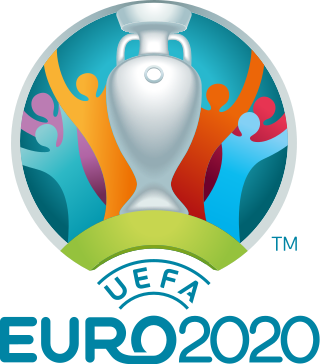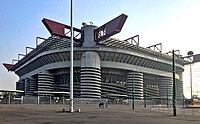
The UEFA European Football Championship, less formally the European Championship and informally the Euro or Euros, is the primary association football tournament organised by the Union of European Football Associations (UEFA). The competition is contested by UEFA members' senior men's national teams, determining the continental champion of Europe. It is the second-most watched football tournament in the world after the FIFA World Cup; the Euro 2016 final was watched by a global audience of around 600 million. The competition has been held every four years since 1960, except for 2020, when it was postponed until 2021 due to the COVID-19 pandemic in Europe, but kept the name Euro 2020. Scheduled to be in the even-numbered year between FIFA World Cup tournaments, it was originally called the European Nations' Cup before changing to its current name in 1968. Since 1996, the individual events have been branded as "UEFA Euro [year]".

The 1960 European Nations' Cup was the inaugural tournament of the UEFA European Championship, held every four years and organised by UEFA. The first tournament was held in France. It was won by the Soviet Union, who beat Yugoslavia 2–1 in Paris after extra time.

The 2020 UEFA European Football Championship, commonly referred to as UEFA Euro 2020 or simply Euro 2020, was the 16th UEFA European Championship, the quadrennial international men's football championship of Europe organised by the Union of European Football Associations (UEFA). To celebrate the 60th anniversary of the European Championship competition, UEFA president Michel Platini declared that the tournament would be hosted in several nations as a "romantic" one-off event, with 11 cities in 11 UEFA countries each providing venues for the tournament, making it the second senior international tournament in history after the 2007 AFC Asian Cup to have more than two nations co-hosting it.

The 2014 UEFA Europa League final was the final match of the 2013–14 UEFA Europa League, the 43rd season of Europe's secondary club football tournament organised by UEFA, and the fifth season since it was renamed from the UEFA Cup to the UEFA Europa League. It was played at the Juventus Stadium in Turin, Italy on 14 May 2014, between Spanish side Sevilla and Portuguese side Benfica. Sevilla won the match 4–2 on penalties, following a 0–0 draw after extra time.
The UEFA Euro 2020 qualifying tournament was a football competition that was played from March 2019 to November 2020 to determine the 24 UEFA member men's national teams that advanced to the UEFA Euro 2020 final tournament, played across Europe in June and July 2021. The competition was linked with the 2018–19 UEFA Nations League, giving countries a secondary route to qualify for the final tournament. For the first time since 1976, no team automatically qualified for the UEFA European Championship as the host country.
The UEFA Euro 2024 qualifying tournament was a football competition that was played from March 2023 to March 2024 to determine the 23 UEFA member men's national teams that would join the automatically qualified host team Germany in the UEFA Euro 2024 final tournament. The competition was linked with the 2022–23 UEFA Nations League, which gave countries a secondary route to qualify for the final tournament.

The UEFA Euro 2020 final was an association football match between Italy and England that took place at Wembley Stadium in London, England, on 11 July 2021 to determine the winner of UEFA Euro 2020. It was the 16th final of the UEFA European Championship, a quadrennial tournament contested by the senior men's national teams of the member associations of UEFA to decide the champions of Europe. Originally scheduled for 12 July 2020, the match had been postponed along with the rest of the tournament due to the COVID-19 pandemic in Europe.
The play-offs of the UEFA Euro 2020 qualifying tournament decided the last four teams that qualified for the UEFA Euro 2020 final tournament, to be staged across Europe in June and July 2021. Unlike previous editions, the participants of the play-offs were not decided based on results from the qualifying group stage. Instead, 16 teams that failed to qualify through their group were selected based on their performance in the 2018–19 UEFA Nations League. The sixteen teams were then divided into four paths, each containing four teams, with each play-off path featuring two single-leg semi-finals and one single-leg final. The four play-off path winners joined the twenty teams that had already qualified for UEFA Euro 2020. The matches were originally scheduled for March 2020, but were postponed to 8 October and 12 November 2020 by UEFA due to the COVID-19 pandemic in Europe.
The 2020–21 UEFA Nations League A was the top division of the 2020–21 edition of the UEFA Nations League, the second season of the international football competition involving the men's national teams of the 55 member associations of UEFA. League A culminated with the Nations League Finals in October 2021 to determine the champions of the competition.

The 2019 UEFA Nations League Finals was the final tournament of the 2018–19 edition of the UEFA Nations League, the inaugural season of the international football competition involving the men's national teams of the 55 member associations of UEFA. The tournament was held in Portugal from 5 to 9 June 2019, and was contested by the four group winners of Nations League A. The tournament consisted of two semi-finals, a third place play-off, and final to determine the inaugural champions of the UEFA Nations League.
The 2020–21 UEFA Nations League was the second season of the UEFA Nations League, an international association football competition involving the men's national teams of the 55 member associations of UEFA. The competition was held from September to November 2020, October 2021 and March 2022.

The 2021 UEFA Nations League final was a football match that determined the winners of the final tournament of the 2020–21 UEFA Nations League. It was the second final of the international football competition involving the men's national teams of the member associations of UEFA. The match was held on 10 October 2021 at the San Siro in Milan, Italy, and was contested by Spain and France.
The 2022–23 UEFA Nations League was the third season of the UEFA Nations League, an international association football competition involving the men's national teams of the 55 member associations of UEFA. The competition was held from June to September 2022, June 2023, and March 2024.
The 2019–20 UEFA Champions League knockout phase began on 18 February with the round of 16 and ended on 23 August 2020 with the final at the Estádio da Luz in Lisbon, Portugal, to decide the champions of the 2019–20 UEFA Champions League. A total of 16 teams competed in the knockout phase.

The 2021–22 UEFA Women's Champions League was the 21st edition of the European women's club football championship organised by UEFA, and the 13th edition since being rebranded as the UEFA Women's Champions League. It was the first edition to feature a double-round-robin group stage, in the same manner as the men's UEFA Champions League.
The second round of the qualification tournament for the 2022 FIFA World Cup from UEFA was contested by twelve teams from the UEFA segment of qualifying. The play-offs determined the final three European teams that joined the group winners at the World Cup in Qatar. The ten runners-up from the UEFA first round groups participated in the play-offs, along with two group winners from the 2020–21 UEFA Nations League. The teams were divided into three paths, each containing four teams, with each play-off path featuring two single-leg semi-finals, and one single-leg final. The matches took place in March and June 2022.

The 2022 UEFA Women's Champions League final was the final match of the 2021–22 UEFA Women's Champions League, the 21st season of Europe's premier women's club football tournament organised by UEFA, and the 13th season since it was renamed from the UEFA Women's Cup to the UEFA Women's Champions League. The match was played at the Juventus Stadium in Turin, Italy on 21 May 2022, between Spanish club Barcelona and French club Lyon, a repeat of the 2019 final.
The UEFA Nations League is a biennial international football competition contested by the senior men's national teams of the member associations of UEFA, the sport's European governing body. The first season began in September 2018 consisting of four groups in each of the four leagues ranked by UEFA coefficient of each country.

The 2023 UEFA Nations League Finals was the final tournament of the 2022–23 edition of the UEFA Nations League, the third season of the international football competition involving the men's national teams of the 55 member associations of UEFA. The tournament was held from 14 to 18 June 2023 in the Netherlands and was contested by the four group winners of Nations League A. The tournament consisted of two semi-finals, a third place play-off and a final to determine the champions of the UEFA Nations League.
















